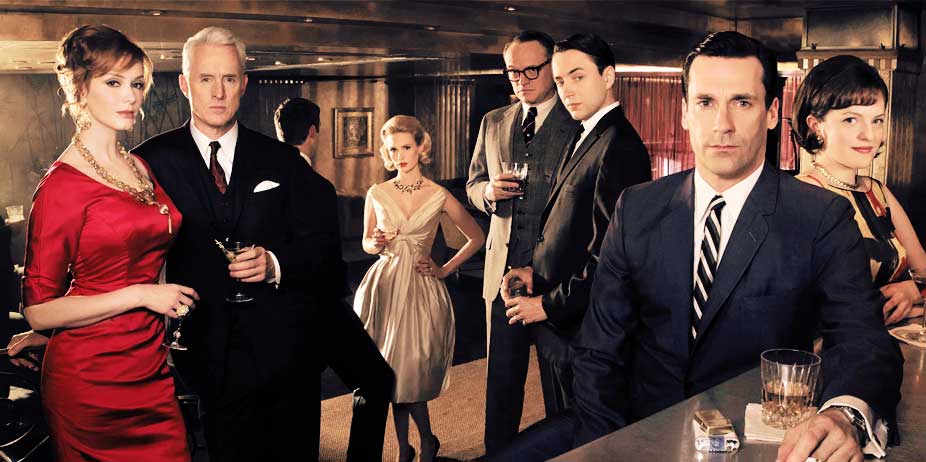
Mad Men, Season Three (2009)
Opening with a controversial episode, the third year of Mad Men had some viewers worried at where it might wind up. But all in all, it may be the series' strongest season...
Things are being shaken up at the offices of Sterling Cooper, the most successful advertising agency in Manhattan. The buy-out initiated by their London associates has brought in a new man, Lance Pryce, to dispose of one third of the staff. Suddenly, most of the lower level employees are wondering if they are going to be at work in the morning. The one man who is unconcerned about his staying power at the firm is Don Draper (Jon Hamm), who has managed to temporarily patch things up with his wife Betty (January Jones) and is awaiting the birth of their next child. But it becomes apparent during a business trip that his interest in women has not altered... and he also learns something shocking about his coworker, Sal (Bryan Batt). In the meantime, the Head of Accounts has been fired, and both Pete (Vincent Kartheiser) and Ken have been appointed to temporarily fill the position, with the implication that whomever comes out on top will land the job.
Peggy (Elisabeth Moss) is still blazing her way through ad copy and hoping for bigger and better things, using her writing talent and charm to make as much headway as she can in an industry built for men. And Joan (Christina Hendricks) is discovering that marital bliss is not all it is cracked up to be... what you found in previous seasons is what is to be expected this time around. There's just as much adultery and fornicating transpiring behind closed doors, but we do get to see a different side of some of the characters. In a way it is very frustrating because just when you think someone is turning the corner and becoming likable, they have another affair or do something equally irritating that makes you fall out with them again. The better characters are Joan, who is sadly under-used but always impacting, thanks in part to a moving and charming performance by Hendricks, and Sal, whose unfortunate situation finds him out in the cold in more ways than one.
We do learn more about Don and his mysterious past and explore the consequences of bad decisions on the part of... well, almost everyone. Betty has an arc midway through that we all saw coming and the storyline goes in an unexpected direction. The final episode deals with the Kennedy assassination and the emotions it arouses within everyone, a significant point in our history and one that is depicted with shock, horror, and emotion. One of the more powerful aspects this year is the experiences of Don and Betty's children, particularly their daughter as she reaches an age where she is fully aware of what is transpiring around her -- too young to totally understand, but old enough to comprehend the implications and be upset. The episode in which someone she loves and admires very much dies is particularly emotional. It also touches on a universal nerve with its storyline following the increasing illness and Alzheimer's of Betty's father. The series implies how divorce impacts children, and continues to highlight the ambition and unhappiness of its immoral leads.
The content is a bit more controversial because the premiere chose to incorporate a scene of homosexual foreplay that was surprisingly graphic. On a business trip, Don becomes enamored with a random woman and we see them kissing and undressing (part of her bare breasts are shown), interspersed with an employee of the hotel coming on to Sal; the two men kiss, and one puts his hand down the front of the other man's pants. It's apparent they intend to go further but are interrupted when a fire alarm goes off. Don continues to bed other women throughout the series, and rekindles his romantic relationship with his wife in one episode (none of it is explicit, just a lot of passionate kissing and implications, usually just as they are "finishing"); Pete cheats on his wife with the neighbor's nanny. Betty becomes involved (not sexually, but romantically) with another man. Later on, it is discovered that a business client is a homosexual, who makes advances on Sal. When he is rejected, retaliation forces Don to fire Sal. Language is limited to occasional profanities, but Jesus' name is taken in vain a half dozen times. The only violence is a particularly gruesome incident involving an office accident with a lawn mower; it's implied that a man's foot is run over; blood sprays bystanders, walls, and the carpet, before the man falls to the ground clutching his half-severed foot and screaming. Conversation and news analysis discusses the Kennedy assassination.
Reviewing a series like Mad Men is difficult, because there's nothing in it to recommend it, at least from a moral perspective. It is, however, an authentic depiction of life during the 1950's and 1960's, warts and all. Our image of an idyllic civilization of morals is rudely interrupted with blatant depictions of racism, sexism, and underhanded dealings. This is a world in which men are allowed to have affairs and women are not. Probably the most shocking moment comes when Don discovers his wife is seeing another man and confronts her by calling her a whore, when in reality it is him who is acting like one. My parents were fortunate to grow up in Christian households, where this kind of relentless misbehavior was not promoted or embraced, but it does remind us that the "good old days" were not all that good after all.
